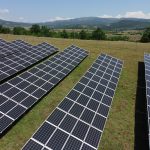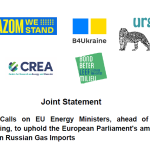For Energy Council on 18 December
Brussels, 13 December 2017
Dear Minister,
Ahead of Energy Council on Monday 18 December, Climate Action Network (CAN) Europe would like to call on you to adopt an ambitious position on the Market Design Initiative, the Renewable Energy Directive, and the Governance of the Energy Union Regulation.
Current proposals in the Estonian Presidency compromise texts for these files are not at all consistent with the EU’s commitments under the Paris Agreement and would endanger the transition to a clean, efficient and just energy system.
Accelerating this transition will bring benefits to European citizens, offering them new rights and economic opportunities, delivering a safer climate, warm homes, clean air, and local green jobs. In order to maximise the potential social, economic and climate benefits from this legislation, the Council needs to raise their level of ambition and substantially improve on key elements. We urge you to support the priorities set out in the Annex to the email below.
The Council now has the opportunity to improve its position in line with these priorities at the Energy Council meeting on 18 December. We urge you to include these points during the discussions.
Yours sincerely,
Wendel Trio
Director, Climate Action Network (CAN) Europe
Annex: Priorities for Clean Energy Package files, Energy Council 18 Dec
Market Design Initiative
A 550gCO2/kWh eligibility criterion for participation in capacity mechanisms
Capacity mechanisms must be used only as a last resort and temporary solution. Their introduction should be conditional on the outcomes of robust Europe-wide resource adequacy assessments performed at the regional level. A 550gCO2/kWh eligibility criterion for participation in capacity mechanisms should be used to exclude the most carbon-intense plants from capacity payments.The latest compromise text from the Presidency removes the criterion of 550gCO2/kWh for existing plants, and further delays its introduction for new plants. This would mean public money would be diverted to coal plants, extending their lifetime and hampering the clean energy transition – a clear contradiction to Paris Agreement commitments. The Council must maintain the 550gCO2/kW criterion for all new and existing plants, and ensure it applies to all plants immediately after the regulation comes into force.
Priority dispatch for renewable energy
The Estonian Presidency proposals essentially remove the right for Member States to grant priority dispatch to new renewable projects from 2021, with only very limited exemptions and even lower thresholds than in the already restrictive Commission proposal. The Council needs to improve its position by securing priority dispatch not only for existing renewable energy capacity, but also new projects. Priority dispatch is needed to correct for market distortions which favour fossil fuel energy sources through subsidies and unpriced externalities. In particular, priority dispatch is essential for smaller installations, often community energy projects, and therefore for public confidence in the energy transition. At the very least, the exemptions thresholds should be reverted back to those in the Commission proposal.
Revised Renewable Energy Directive
A binding target of at least 45% for 2030
A target of at least 45% is needed to accelerate renewables deployment in line with the Paris Agreement and ensure additional social, economic and health benefits. The current Council position of at least 27% was agreed upon before the successful outcome of the Paris Climate Conference and follows a Commission proposal based on outdated and overpriced cost assumptions for wind and solar. Such a low target would drastically slow down current levels of renewable energy deployment. The Council now needs to revise this target upwards. The ITRE Committee of the European Parliament recently supported a target of ‘at least 35%’.
Binding national targets (Article 3)
Binding national targets should be maintained as the best proven way to ensure Member States collectively achieve the EU renewables target, to cement investor confidence, to ensure balanced renewables deployment across the EU and to reduce capital costs for all Member States.
Stronger definitions / rights for energy citizens and communities (Articles 2, 21 & 22)
EU-level definitions of ‘renewable self-consumers’ and renewable energy communities should be supported. Renewable self-consumers should receive remuneration for electricity fed into the grid which also reflects its value to the environment and society. This will strengthen public support for the transition.
National support schemes as a driver for renewable deployment (Article 4)
The Council should cement its position behind national support schemes.This would allow Member States to enact technology-specific tenders in ways that are tailored to local conditions and needs – which is good for diversity of supply and energy security – and provide specific support for small-scale installations and demonstration projects.
Support only sustainable & low carbon bioenergy (Articles 3, 7, 25, 26, 28 & annex IX)
It is crucial that the revised Renewable Energy Directive includes stringent sustainability criteria for the use of bioenergy. The revised Directive should phase out all food and feed based biofuels by 2030, and should not include a renewable energy target for the transport sector. It should not support the use of whole trees for bioenergy production and the use of biomass for electricity production should only be supported when applying highly efficient cogeneration technology.
Governance of the Energy Union Regulation
Linear trajectories
Planning on the basis of linear trajectories for the deployment of renewable energy and energy efficiency between 2021 and 2030 will ensure that both Member States and the EU as a whole will be able to assess whether they are on track to meet their 2030 targets, and if necessary to take corrective action in due time. It is also a necessary provision for investors to feel confident that renewables will grow within their home market, hence giving them certainty to invest. We therefore urge you to support a requirement for Member States to follow linear trajectories between 2021-2030, and ensure the trajectories are binding. As a second best option, the Council should agree on binding biannual milestones for the Commission to use to track progress.
Legally binding NECP templates
The European Court of Auditors recently published a landscape review of the state of play of EU climate and energy policy and they concluded that the lack of a coherent and robust climate and energy governance system is the main challenge Europe is currently facing in implementing its policy obligations. The commitment of Member States to produce one integrated plan (NECP) and regularly improve it is a good step in the right direction to ensure the transition is properly managed, and a sustainable energy future for Europe is successfully delivered. The NECPs will also be industry’s reference documents for making business: NECPs need to provide the same, standardised and reliable information for all Member States in order to ensure accountability and comparability. Further, revised NECPs should reflect an increase in ambition, as required by the EU’s commitments under the Paris Agreement. To this end, we urge you to to safeguard a binding template, with sufficient level of detail for NECPs.
Better guidance on long term provisions
To comply with the long term goals of the Paris Agreement, global fossil fuel emissions need to be phased out and should be replaced by 100% renewable energy by 2050 at the latest. The long term climate and energy strategies (Article 14 of the regulation) must be designed to contribute to delivering on the long term objectives of the Paris Agreement. Coherence between the short term plans (NECPs) and ambitious long term strategies must be ensured. The long term climate and energy strategies should also be developed within the same time frame as the NECPs. A binding template for the long term strategies should accompany the binding template for the NECPs. This would help to put in place enabling conditions for the deeper structural changes needed in the economy and energy system to reach the goals of the Paris Agreement. The amendment adopted in the European Parliament on this matter gives good guidance on this.



